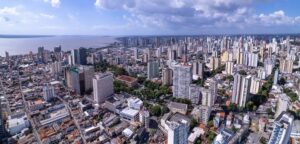- SIWI – Leading expert in water governance
- /
- Latest
- /
- Q&A with Dr Martina Klimes on the NEW Routledge Handbook of Water Diplomacy

Q&A with Dr Martina Klimes on the NEW Routledge Handbook of Water Diplomacy
As global water challenges grow more complex, the need for cooperation has never been greater. Ahead of the online release of the Routledge Handbook of Water Diplomacy, we spoke with SIWI’s Dr Martina Klimes, one of the book’s editors, about how water can serve as a bridge for peace, what makes this publication a game-changer for practitioners worldwide, and how it connects to SIWI’s ongoing work to foster dialogue and trust around shared waters.

Q: Martina, congratulations on the release of the Routledge Handbook of Water Diplomacy. For those hearing about it for the first time — what is it, and why does it matter?
Thank you! This handbook has been years in the making, and it’s a very special project. It’s a comprehensive, practice-oriented guide to how we can use water as a pathway for cooperation rather than conflict. In contexts marked by political tensions, this book offers concrete tools that can be applied in practice. Water connects people, sectors, and nations — and that means it also carries the potential for tension. But it doesn’t have to. The Routledge Handbook of Water Diplomacy brings together more than 80 contributors from around the world who show, through theory and real-world cases, how science, negotiation, and relationship-building can come together to solve complex water challenges.
It’s designed to help everyone — from policymakers to community leaders — think and act differently about shared waters. It’s not just about dividing resources; it’s about building trust and systems that can adapt to uncertainty, climate change, and shifting political realities. An important point I’d like to highlight is that the Handbook is freely accessible online. Early in the process, we realized we didn’t want to create something on such an important topic and then hide it behind a paywall. Thanks to our partnership with UNESCO, we were able to make it open and available to everyone right from the start.
Q: What makes this handbook different from other publications on water governance or diplomacy?
There are a lot of excellent technical books and academic studies out there, but they often stay at a theoretical level. What we wanted to do here is bridge the gap between knowledge and action. This is not a static book — it’s a living resource that links directly to AquaPedia, an online case study platform. That means it keeps evolving as practitioners share new lessons from the field.
Another big difference is structure. The handbook has two pathways: Working Together and What Matters and Why. The first helps readers see water diplomacy through the lens of their role — whether they are researchers, funders, decision-makers, or members of affected communities. The second explores what really drives success: trust, inclusion, learning, and managing uncertainty. Together, they offer both a conceptual framework and a set of practical tools that people can actually use in their daily work.
Q: Who contributed to this effort, and how did such a broad collaboration come together?
It’s truly a global collaboration — a community of water diplomacy in action! My co-editors are Professor Shafiqul Islam from Tufts University, Dr Aaron Salzberg from the University of North Carolina’s Water Institute, and Kevin Smith from the University of Massachusetts Amherst. The authors include academics, diplomats, engineers, and practitioners from more than 30 countries.
Key institutional partners include Tufts and UNC, along with international organizations like SIWI and ICWC, the OSCE, UN INWEH, UNESCO, and the Ford Foundation. Each brings a different perspective, science, governance, funding, community engagement, and that’s what makes the book so rich. It reflects real experiences from people working in transboundary basins, from the Yarlung Zangbo–Brahmaputra to the Colorado River, and at local levels where water and livelihoods are deeply intertwined.
I also want to extend a special thanks to the International Centre for Water Cooperation (ICWC), a UNESCO Category II Centre hosted by SIWI, for their invaluable support in the development of the handbook. Their backing helped make this collaboration possible.
Q: What are some of the most important lessons readers will take away?
First and foremost, there is no single formula for success. Every water challenge is unique, shaped by geography, culture, and politics. What works in one basin might fail in another and that’s okay. The key is to focus on process rather than perfect solutions.
We also stress that water diplomacy is about relationships, not just resources. It’s about how people cooperate under pressure and how institutions evolve to manage shared risks. Another key message is that science and diplomacy must work together. Data matters, but so do perceptions, values, and trust. It is not about solving water problems – it’s about solving people’s problems with water.
And finally, water diplomacy is not a one-off event. It’s an ongoing process of learning by doing. That’s why we call it a “living” handbook: it’s built to grow, adapt, and respond as conditions change.
Q: How does this connect to SIWI’s work and vision?
In ways, it builds on what SIWI has been doing for years. The Handbook reflects the same principles many that underpin the Shared Waters Partnership, SIWI’s contribution to the Stockholm Hub on Environment, Climate, and Security, varies water diplomacy capacity development initiatives and last but not least SIWI’s contribution to setting up the Women in Water Diplomacy Network: dialogue, inclusivity, and learning.
At SIWI, we believe that building trust and relationships is as important as building infrastructure. The Handbook gives practitioners a framework for doing that, for turning complex science and political realities into constructive negotiation. It also supports SIWI’s work in global policy arenas, like the UN Water Convention, COP processes, and OSCE (Organization for Security and Co-operation in Europe) dialogues, where we emphasize that water cooperation is fundamental to peace and stability and several informal dialogues that SIWI leads.
Q: Can you give an example of the kind of stories or insights the book shares?
One great example is the case of Sukhomajri in India, where a small community transformed conflict over water into cooperation by creating an inclusive management system. Another is the U.S.–Mexico negotiations over the Colorado River. This is a story that shows how trust, even after decades of tension, can rebuild cooperation. Each case is different, but together they show the power of adaptive, principled negotiation to change outcomes for people and ecosystems.
Q: What’s next — and how can people get involved?
The online version will be released very soon, and we’re planning several launch events, including one at the European Economic and Social Committee in Brussels on November 5. There will also be regional discussions and training sessions linked to the Handbook, so it’s really just the beginning.
We’re inviting practitioners, researchers, and policymakers everywhere to engage with the ideas — and to contribute their own experiences through AquaPedia. The goal is to keep this resource alive and evolving, just like the practice of water diplomacy itself.
Q: If you could sum up the Routledge Handbook of Water Diplomacy in one sentence, what would it be?
It’s a practical guide for anyone who believes that cooperation over water is possible and wants to know how to make it happen.
The Routledge Handbook of Water Diplomacy is now available online. Stay tuned for launch details and stories from the global community behind it — and special thanks to the International Centre for Water Cooperation (ICWC) for their support in making this work possible.
Most recent

SIWI Reflections 2025: When Indigenous voices shape global water dialogue
- World Water Week
- Indigenous knowledge
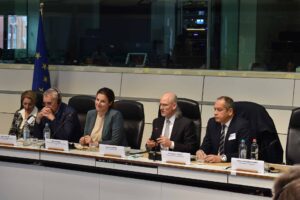
SIWI Reflections 2025: When knowledge begins to travel
- Water diplomacy
- Water cooperation
- Water and Peace
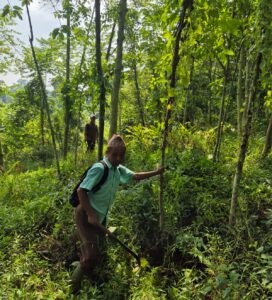
SIWI Reflections 2025: When water-smart restoration builds change from the ground up
- Freshwater and ecosystems/biodiversity
- Water in landscapes
- Water governance
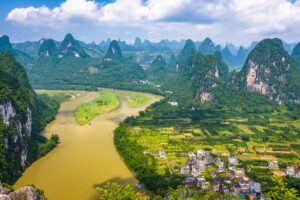
Reflections on the Routledge Handbook of Water Diplomacy: Building cooperation in a complex world
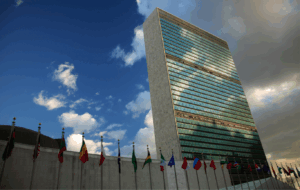
SIWI Urges Ambitious, Inclusive Approach at UN Preparatory Meeting for 2026 Water Conference
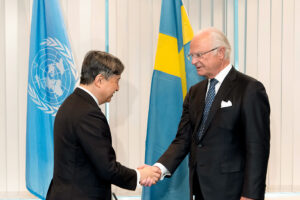
Sweden and Japan Join Forces on Water and Climate at High-Level Tokyo Seminar

